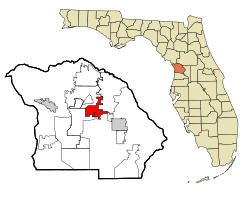Census-designated place in Florida, United States
| Citrus Hills | |
|---|---|
| Census-designated place | |
 Location in Citrus County and the state of Florida Location in Citrus County and the state of Florida | |
| Coordinates: 28°53′10″N 82°25′24″W / 28.88611°N 82.42333°W / 28.88611; -82.42333 | |
| Country | |
| State | |
| County | Citrus |
| Area | |
| • Total | 9.70 sq mi (25.12 km) |
| • Land | 9.70 sq mi (25.11 km) |
| • Water | 0.00 sq mi (0.01 km) |
| Elevation | 115 ft (35 m) |
| Population | |
| • Total | 9,302 |
| • Density | 959.36/sq mi (370.43/km) |
| Time zone | UTC-5 (Eastern (EST)) |
| • Summer (DST) | UTC-4 (EDT) |
| FIPS code | 12-12412 |
| GNIS feature ID | 1853242 |
Citrus Hills is a census-designated place (CDP) in Citrus County, Florida, United States. The population was 9,302 at the 2020 census, up from 7,470 at the 2010 census. It is part of the Homosassa Springs, Florida Metropolitan Statistical Area.
The CDP takes its name from The Villages of Citrus Hills, a master-planned community first developed by Gerald Nash and Sam Tamposi in the 1970s. (Although sharing a similar name with The Villages, the well-known giant Central Florida retirement community, the two developments are not related.)
Geography
Citrus Hills is located northeast of the center of Citrus County at 28°53′10″N 82°25′24″W / 28.88611°N 82.42333°W / 28.88611; -82.42333 (28.886087, -82.423450). It is bordered by Pine Ridge to the north, Hernando to the northeast, Inverness Highlands North to the east, and Lecanto to the south and west. Citrus Hills is approximately 9 miles (14 km) northwest of Inverness, the Citrus County seat.
According to the United States Census Bureau, Citrus Hills has a total area of 9.7 square miles (25.1 km), of which 0.004 square miles (0.01 km), or 0.05%, is water.
Demographics
| Census | Pop. | Note | %± |
|---|---|---|---|
| 2000 | 4,029 | — | |
| 2010 | 7,470 | 85.4% | |
| 2020 | 9,302 | 24.5% | |
| U.S. Decennial Census | |||
As of the census of 2000, there were 4,029 people, 1,783 households, and 1,485 families residing in the CDP. The population density was 411.2 inhabitants per square mile (158.8/km). There were 2,137 housing units at an average density of 218.1 per square mile (84.2/km). The racial makeup of the CDP was 92.78% White, 1.44% African American, 0.32% Native American, 4.02% Asian, 0.45% from other races, and 0.99% from two or more races. Hispanic or Latino of any race were 2.83% of the population.
There were 1,783 households, out of which 15.1% had children under the age of 18 living with them, 78.4% were married couples living together, 3.4% had a female householder with no husband present, and 16.7% were non-families. 13.7% of all households were made up of individuals, and 8.0% had someone living alone who was 65 years of age or older. The average household size was 2.26 and the average family size was 2.46.
In the CDP, the population was spread out, with 13.3% under the age of 18, 2.2% from 18 to 24, 13.3% from 25 to 44, 36.6% from 45 to 64, and 34.6% who were 65 years of age or older. The median age was 59 years. For every 100 females, there were 96.1 males. For every 100 females age 18 and over, there were 94.5 males.
The median income for a household in the CDP was $48,229, and the median income for a family was $53,222. Males had a median income of $35,125 versus $24,875 for females. The per capita income for the CDP was $25,753. About 4.3% of families and 6.5% of the population were below the poverty line, including 16.2% of those under age 18 and 1.4% of those age 65 or over.
Education
The CDP is served by Citrus County Schools. Elementary schools serving sections of the CDP include Central Ridge, Forest Ridge, and Hernando. Middle schools serving sections of the CDP include Citrus Springs, Inverness, and Lecanto. High schools serving sections of the CDP include Citrus High School and Lecanto High School.
References
- "2020 U.S. Gazetteer Files". United States Census Bureau. Retrieved October 31, 2021.
- ^ "U.S. Census website". United States Census Bureau. Retrieved January 31, 2008.
- "US Board on Geographic Names". United States Geological Survey. October 25, 2007. Retrieved January 31, 2008.
- ^ "Geographic Identifiers: 2010 Demographic Profile Data (G001): Citrus Hills CDP, Florida". U.S. Census Bureau, American Factfinder. Archived from the original on February 12, 2020. Retrieved June 25, 2014.
- "US Gazetteer files: 2010, 2000, and 1990". United States Census Bureau. February 12, 2011. Retrieved April 23, 2011.
- "Census of Population and Housing". Census.gov. Retrieved June 4, 2016.
- "2010 CENSUS - CENSUS BLOCK MAP (INDEX): Citrus Hills CDP, FL." U.S. Census Bureau. Retrieved on February 3, 2017. Compare this map to the attendance boundary maps of the school district.
- "Citrus County Elementary School Attendance Boundaries Archived 2015-02-26 at the Wayback Machine." Citrus County Schools. Retrieved on February 2, 2017.
- "Citrus County Middle School Attendance Boundaries Archived 2015-02-26 at the Wayback Machine." Citrus County Schools. Retrieved on February 2, 2017.
- "Citrus County High School Attendance Boundaries Archived 2015-02-26 at the Wayback Machine." Citrus County Schools. Retrieved on February 2, 2017.
External links
| Municipalities and communities of Citrus County, Florida, United States | ||
|---|---|---|
| County seat: Inverness | ||
| Cities |  | |
| CDPs | ||
| Unincorporated communities | ||
| Ghost towns | ||